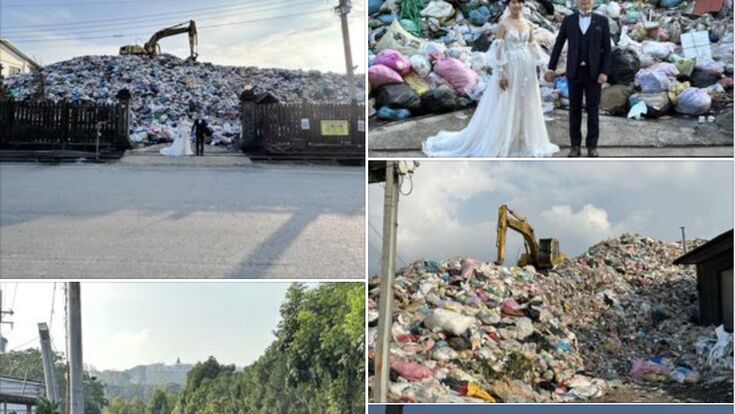Landfill : Taiwan couple raises environmental awareness - in an original way

Facebook Profile: Taiwan couple takes wedding photo at garbage dump, hopes to raise environmental awareness
- © Facebook Post HsueThe picture was shared on the social media platform on 15th October. The bride, identified as Hseuh, clarified her motive for choosing Puli’s “garbage mountain” as the backdrop for their photo shoot. She highlighted the urgent issue of excessive consumer waste, stressing that this matter goes beyond Puli and Nantou. Her aim is to motivate people all over Taiwan to actively reduce waste in their day-to-day lives through the images. The couple specifically expresses their desire for enhancements in Puli and other towns, while simultaneously aiming for a reduction in waste levels countrywide in the coming years.
Their innovative approach garnered acclaim from online users for their endeavours to bring attention to this problem. Currently, Puli City is confronted with a scarcity of satisfactory waste management facilities, leading to an excessive amount of surplus trash accumulating and creating a garbage mountain nearly four storeys tall next to the local Office of Waste Management. The popular wedding photo of the couple was shared by both the Waste Management Office and Hseuh.
Hseuh, who comes from northern Taiwan instead of Nantou, travelled south for the photo session. According to Hseuh, when she first suggested the idea of a photo shoot at the landfill, the wedding photographer thought she was joking.
The wedding photographer, with thirty years' experience under their belt, admitted that this was their initial encounter with such an appeal. Puli is currently scouting for a suitable site to improve their waste management infrastructure, as reported by the Central News Agency (CNA).
Additionally, Hseuh expressed her appreciation for her significant other's unwavering encouragement towards her unconventional choice of location for their wedding photography session, conveyed via online remarks. The couple plans to celebrate their wedding in January with an ecologically responsible, vegetarian ceremony. Guests are kindly requested to bring their own containers and utensils.
According to UDN, the Nantou County government coincidentally signed a public-private partnership contract with "Cleanaway," a private waste management company, today. The contract entrusts the company to handle 67,500 tonnes of waste from Nantou City for three years.
The company will be responsible for handling the city's daily waste production of 60 tonnes as well as the accumulated 20,000 tonnes over the course of several years, with a total budget of almost 500 million TWD.
Nantou City's County Mayor Hsu Shu-hua and Cleanaway's Deputy General Manager Tsai Shijie signed the contract this afternoon in the county government building lobby. The agreement entails the company to manage and dispose of 67,500 tonnes of waste over three years, starting from this year.
Hsu observed that this year, the total waste amassed in the county amounts to 230,000 tonnes. Despite the county government identifying eight cities and counties that can incinerate 80,000 tonnes of Nantou County's waste on a yearly basis, it falls short of the required transportation capacity to manage the daily production of 250 tonnes of waste and the accumulated waste. Consequently, there is a need to utilise private sector resources through public-private partnerships to address the waste problem.
According to a report from the United Daily News (UDN), employees at the local council must tolerate the permeating and persistent scent that emanates from the towering "garbage mountain" throughout their work shifts.
Additionally, due to the landfill's location on Lingxing Road in the urban area, residents in the vicinity have long griped about the intolerable odour, notably during hot weather. As a result, Nantou City has been given priority for the allocation of special project funds to manage waste reduction efforts.
The Nantou County Environmental Protection Bureau has confirmed that the public-private partnership plan will cover a three-year period. The cost of waste processing is 7,350 TWD per ton in the first year, with a total of 13,000 tons to be processed. This includes the cost of screening equipment and a budget of £2.5 million.
